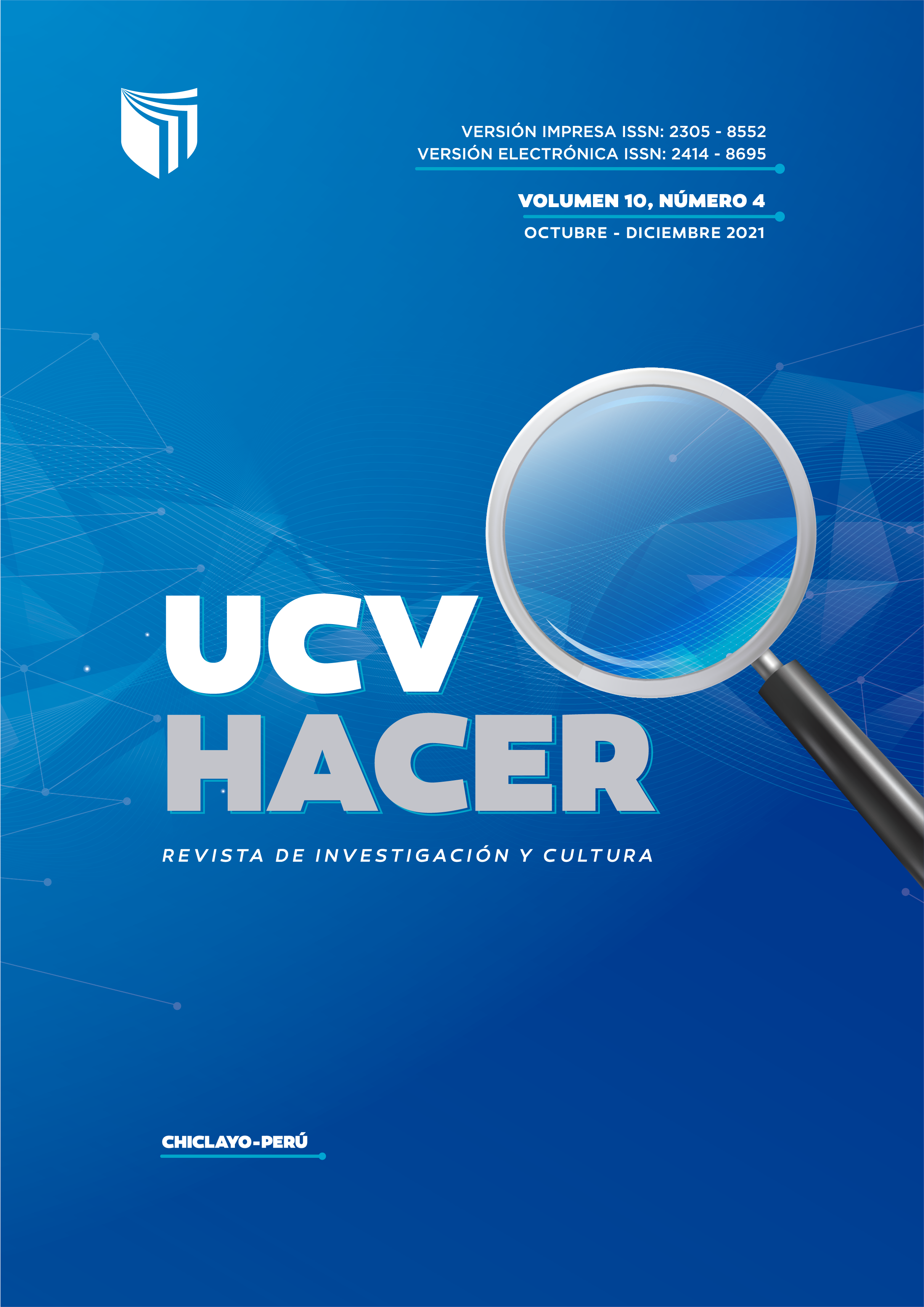Work stress and burnout syndrome during the pandemic in teachers of a Peruvian educational association
DOI:
https://doi.org/10.18050/RevUCVHACER.v10n4a4Keywords:
Pandemia, Estrés laboral, Síndrome de burnout, Agotamiento emocional, Despersonalización, Falta de realización personalAbstract
Most education systems around the world, schools in Peru turned to online teaching in late March 2020, after face-to-face classes were halted due to the outbreak of the COVID-19 pandemic. Although few teachers were prepared to teach their lessons online in this setting, the study aimed to determine the relationship between job stress and burnout syndrome during the pandemic in teachers of a Peruvian educational association. The study was quantitative, correlational, cross-sectional and of a nonexperimental design, where the sample consisted of 105 teachers who were selected through a nonprobabilistic convenience sampling. The results found reveal that Pearson's correlation coefficient ρ indicates that there is a highly significant positive relationship between stress and Burnout syndrome (ρ = .74; p <.01) and its Emotional Tiredness dimensions (ρ = .77; p <.01), Depersonalization (rho = .58; p <.01) and Lack of Personal Fulfillment (ρ = .49; p <.01). It is concluded that the greater stress in the teaching population, there will be greater burnout syndrome, as well as emotional exhaustion, depersonalization and lack of personal fulfillment during the pandemic.
Keywords: Pandemic, work stress, burnout syndrome, emotional exhaustion, depersonalization, lack of personal fulfillment.
References
Adewale, A., Ghavifekr, S. y Abdulsalam, I. (2017). Impact of stress on academic staff: Implication for higher education management and leadership. Malaysian Online Journal of Educational Management,5(2), 75-91. https://doi.org/10.22452/mojem.vol5no2.5
Alava, D., Avila, M. y Castro, J. (2021). Seroprevalence of covid-19, risk factors and biosecurity protocols in health personnel of the city of Jipijapa-province of Manabí-Ecuador. Polo Del Conocimiento, 6(7), 3-18. https://doi.org/10.23857/pc.v6i7.2825
Asaloei, S., Wolomasi, A. Y. y Werang, B. (2020). Work-related stress and performance among primary school teachers. International Journal of Evaluation and Research in Education, 9(2), 352-358. https://doi.org/10.11591/ijere.v9i2.20335
Brar, G. y Singh, N. (2020). Stress management at workplace: An approach focussed on COVID-19. Indian Journal of Health and Well-Being,11, 475–478. https://www.proquest.com/openview/ca4971f16a6a4543a83e130f0a3981c8/1?pq-origsite=gscholar&cbl=2032134
Cabezas, E., Andrade, D. y Torre, J. (2018). Introducción a la metodología de la investigación científica. http://repositorio.espe.edu.ec/handle/21000/15424
Choy, R. (2017). Burnout y desempeño laboral en docentes universitarios de una carrera en una universidad privada de Lima Metropolitana. [Tesis de Maestría, Universidad Peruana Cayetano Heredia]. Repositorio Cayetano Heredia http://repositorio.upch.edu.pe/handle/upch/1011
De Arco, P. y Castillo, J. (2020). Síndrome de Burnout en época de pandemia: caso colombiano. Interconectando Saberes, 10, 115-123. https://doi.org/10.25009/is.v0i10.2675
Delgado-Gallegos, J., Montemayor-Garza, R., Padilla-Rivas, G., Franco-Villareal, H. y Islas, J. (2020). Prevalence of stress in healthcare professionals during the covid-19 pandemic in Northeast Mexico: A remote, fast survey evaluation, using an adapted covid-19 stress. scales. International Journal of Environmental Research and Public Health, 17(20), 1-12. https://doi.org/10.3390/ijerph17207624
Espinosa-izquierdo, J., Moran-Peña, F. y Granados-Romero, J. (2021). The Burnout Syndrome and its effect on teacher performance in times of pandemic. Polo Del Conocimiento, 6(3), 670–679. https://doi.org/10.23857/pc.v6i3.2395
Freyre, J., Del Aguila., K. y Coral, N. (2020). Estilos de afrontamiento y burnout el personal de Salud de la ciudad de Yurimaguas. [Tesis de Pregrado, Universidad Peruana Unión]. Repositorio Universidad Peruana Unión http://hdl.handle.net/20.500.12840/3802
Granados, L., Aparisi, D., Inglés, C., Aparicio, M., Fernández, A. y García, J. (2019). ¿Predicen los factores de depresión, ansiedad y estrés la dimensión de la despersonalización y la baja realización personal en el profesorado?. European Journal of Child Development, Education and Psychopathology, 7(1), 83. https://doi.org/10.30552/ejpad.v7i1.91
Harmsen, R., Helms-Lorenz, M., Maulana, R. y Van, K. (2018). The relationship between beginning teachers’ stress causes, stress responses, teaching behaviour and attrition. Teachers and Teaching, 24(6), 626–643. https://doi.org/10.1080/13540602.2018.1465404
Hassanzade Daloee M., Akbari Rad M., Rajabzadeh Karizi S., y Sarabi, M. (2020). Physician Burnout: a Brief review of its definition, causes, and consequences. Reviews in Clinical Medicine, 7(4), 150–156. https://rcm.mums.ac.ir/article_17023.html
Jason, D., Hastings., R. y Noone, S. (2009). Staff Stress and burnout in intellectual disability services: work stress theory and its application. Journal of Applied Research in Intellectual Disabilities, 22, 561–573. https://doi.org/10.1111/j.1468-3148.2009.00509.x
Lazarus, R. (1999). Stress and Coping: A New Synthesis. Springer, New York.
Lazarus R. y Folkman, S. (1984). Stress, Coping and Adaptation. Springer New York.
Leon, P., Lora, M. y Rodriguez, J. (2021). Relationship between lifestyle and work stress in nursing staff in times of COVID-19. Revista Cubana de Enfermería, 37(6), 1–15. https://revenfermeria.sld.cu/index.php/enf/article/view/4043
Makhdoom, I., Atta, M. y Malik, N. (2019). Counterproductive work behaviors as an outcome of job burnout among High school teachers. Bulletin of Education and Research August, 41(2), 79-92. https://files.eric.ed.gov/fulltext/EJ1229449.pdf
Marshall, D., Shannon, D. y Savanna, M. (2020). How teachers experienced the COVID-19 transition to remote instruction. Phi Delta Kappan, 102(3), 46-50. https://doi.org/10.1177/0031721720970702
Moreno, B., Garrosa, E. y Gonzales, J. (2000). La evaluación del estrés y el burnout del profesorado: el CBP-R. Revista de Psicología Del Trabajo y de Las Organizaciones, 16, 151–171. https://journals.copmadrid.org/jwop/files/63238.pdf
Navinés, R., Olivé, V., Fonseca, F. y Martín-Santos, R. (2021). Work stress and resident burnout, before and during the COVID-19 pandemia: An up-date. Medicina Clínica. 157(3), 130-140. https://doi.org/10.1016/j.medcli.2021.04.003
Navinés, R. Martín-Santos, R., Olivé, V. y Valdés, M. (2016). Estrés laboral: implicaciones para la salud física y mental. Medicina Clinica, 146(8), 359–366. https://doi.org/10.1016/j.medcli.2015.11.023
Pappa, S., Athanasiou, N., Sakkas, N., Patrinos, S., Sakka, E., Barmparessou, Z., Tsikrika, S., Adraktas, A., Pataka, A., Migdalis, I., Gida, S. y Katsaounou, P. (2021). From recession to depression? Prevalence and correlates of depression, anxiety, traumatic stress and burnout in healthcare workers during the covid-19 pandemic in greece: a multi-center, cross-sectional study. International Journal of Environmental Research and Public Health, 18(5), 1–16. https://doi.org/10.3390/ijerph18052390
Parihuamán, M. (2017). Nivel de estrés de los docentes de las instituciones educativa de villa Vicús y Kilómetro 50, distrito de Chulucanas Morropón, Piura. [Tesis de Maestría, Universidad de Piura]. Repositorio Universidad de Piura https://hdl.handle.net/11042/3022
Perveen, A., Hamzah, H., Othamn, A. y Ramlee, F. (2020). Prevalence of anxiety, stress, depression among malaysian adults during COVID-19 pandemic movement control order. Indian Journal of Community Health, 32(3), 579-581. https://doi.org/10.47203/IJCH.2020.v32i03.020
Pressley, T. (2021). Factors Contributing to Teacher Burnout During COVID-19. Educational Researcher, 5, 325-327. https://doi.org/10.3102/0013189X211004138
Salahshour, F. y Esmaeili, F. (2021). The causes of burnout among Iranian EFL Academics: A case study. Iranian Journal of Language Teaching Research, 9(1), 123-137. https://doi.org/10.30466/ijltr.2021.120979
Serinikli, N. (2019). İş Stresinin İşten Ayrılma Niyetine Etkisinde Örgütsel Bağlılığın Aracılık Rolü. Business and Economics Research Journal, 10(4), 915-928. https://doi.org/10.20409/berj.2019.210
Shen, P. y Paul, S. (2021). The effect of occupational stress and coping strategies on mental health and emotional well-being among university academic staff ruring the COVID-19 outbreak. International Education Studies, 14(3), 82-95. https://doi.org/10.5539/ies.v14n3p82
Thatrimontrichai, A., Weber, D. y Apisarnthanarak, A. (2021). Mental health among healthcare personnel during COVID-19 in Asia: A systematic review. Journal of the Formosan Medical Association, 120(6), 1296–1304. https://doi.org/10.1016/j.jfma.2021.01.023
Downloads
Published
How to Cite
Issue
Section
License
Copyright (c) 2021 UCV Hacer

This work is licensed under a Creative Commons Attribution-NonCommercial-ShareAlike 4.0 International License.










